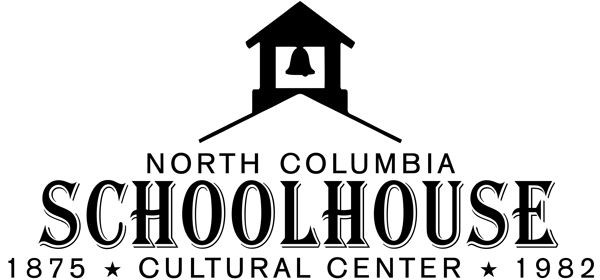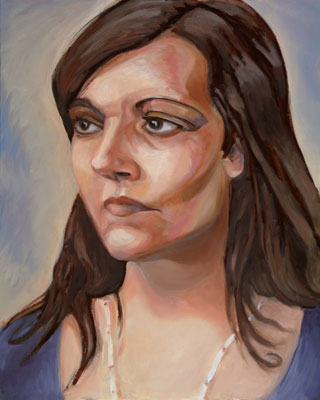“The thing of it is – they never lost their culture, they never lost their family. I don’t care how far back or what they were, they always were together. One time a year, pow-wows; one time a year, get together. The elders always come first, then the kids, and then the families – the elder ones. But nobody has lost it. That’s the beauty part of it. You say how come they do this or they do that? Different generations. There’s four generations to a world. So the first 25, they’re surviving and learning. The second 25 they’re raising a family. And the third 25, you’re on your way out.”
–Alberta (Rose) Gallez, sister of Ginger (Rose) Covert and aunt to Shelly Covert (pictured)
An Excerpt from the Interview
NCSCC: What do you think is important for people who are going to be hearing this interview – people who live on the Ridge now – to know about the Nisenan?
Ginger Covert: Well first and foremost, probably that we’re not extinct, that we’re still here.
Shelly Covert: For me personally when people hear this – especially if they’re old, settling families – a lot of the people outside of our culture have more stories than what remain within our culture. And you know, sometimes people will hear one little story. We had a non-native person tell us a terrible story. His mom was saying our chairman, Richard Johnson – his parents lived here on Nevada City Rancheria – told the stories about when he was a little boy, he was about seven. He remembers as a child seeing the sheriff in town beat old man Johnson over the head and knock him down and their groceries rolled down the street, and he remembered being a child, being so scared and wondering “why? Why are you doing that to them?” And as a child, he couldn’t figure. But that story, although it is very sad, it gives a glimpse into that time. You know that’s the ‘40s. We’re not talking 1800s wild west here. A lot of the stories mom and Aunt Birdie [Ed. note: nickname for Alberta Gallez] are talking about today, mom was born in 1945. We’re not talking hundreds of years ago, this is fairly current things that are happening to the people.
That is my favorite thing for the settling families or other natives – if you have a story about the Nisenan, then it’s wonderful that you talk about the stories coming from the land because we were the people who were here, and these families were always here, although hidden in the shadows. But we really encourage people to bring their stories forward, especially if you have photos or any talk about the places and the people who were there. Mom was mentioning the Housels because they were part Cornish, part Nisenan and they were wrestlers and they were brothers and they lived right out on Tyler Foote Road. But some people remember them. They remember that the one older brother, when it would come Thanksgiving or Christmas, he would go around to everybody’s house – he was a really robust man. He would go around and get a little bit of dinner everywhere.
And that story also came down through a non-native family, and they said “oh, we remember him.” And a lot of times, the intonation is negative about those people: “they were dirty,” or just some of those things, little pieces that remain still. The way people look at native people as a little bit less than.
Ginger Covert: I think that when you said that – they’re a little bit dirty – that’s one of the things. Not too many times do I remember people making comments, but often it was always the “dirty Indians.” And I used to get so upset because that was the one thing. We were so clean, probably maybe more than many people. My father was so worried about that all the time. I remember when we were living out in Diamantine, when we hauled our water in and everything, the first thing we did when we got out of bed in the morning was go wash.
We washed our face and hands and combed our hair and got ready for the day, you know? My mom, I don’t care if it was in a creek and hanging on a bush, our clothes were always clean. They might be old, but they were always clean. So when I heard comments referring to dirty Indians, I used to go what do they mean? Why? What?
Shelly Covert: Well because the people lived on the land, and dirt is not dirty to a lot of people. Some people, you want your bed up off the floor, your chair off the floor, everything’s off the floor. The floor’s not sanitary (in their mind).
Alberta Gallez: Things are so tight, if you remember in ‘69, ‘70, ‘71, when they were getting roll numbers of all the Indians in the state of California – not only Nevada County – my dad says don’t do it, don’t do it. Don’t give them the blood line, because they were run out. His father lived here in Nevada City, and his father got away to Dry Creek. They got some of the kids, they had a little problem, but then the government came and round up the kids. My dad was living with his brother Dan, with a cow, the baby Uncle Louis, Aunt Lil, Aunt Muriel, Aunt Mabie, and had the baby tied on the side of the cow. The cow fed the baby.
Okay, so they did all this hideout but they got caught because the schoolteacher in Smartsville turned them in because my Aunt Lil stole some beans from the school. So anyway, they were picked up and taken away. But my dad always said don’t give out a number, don’t give out a name. And he was still not happy up until the day he left. He wasn’t happy about bringing all this to a head. They were ashamed of what happened, let’s put it that way. But he was a smart, smart man. Very smart.
Ginger Covert: And I think with him, he didn’t trust. But he liked everyone. He was just really common sense to the utmost. The story I was going to tell you about Uncle Louis when she mentioned them living on the river with Uncle Dan, and they had come to get them, they were taking them to Indian school so they just headed down the river. But they had Uncle Louis who was a baby because they picked up grandma and put her in a mental institution, and they had put my grandfather in prison. He was there. So anyway, was that before or after? I’m confused. But anyway, they stole the cow. Uncle Louis was just a little baby. They tied him on the back of the cow, that’s how he stayed warm, and they’d milk the cow to feed him. He survived.
Alberta Gallez: I heard so many stories that were so good, but a lot of them, I wrote down and told the stories but I didn’t give them out from what daddy told me and what mom told me and what my aunts… I used to go down and live on the old riverbank, just my aunts, they were all old and they’d tell me all the stories, what they were hiding from public. A lot of things. But it was really true and I grew up, but when I was younger it was an interesting story, tell me more, tell me more.

